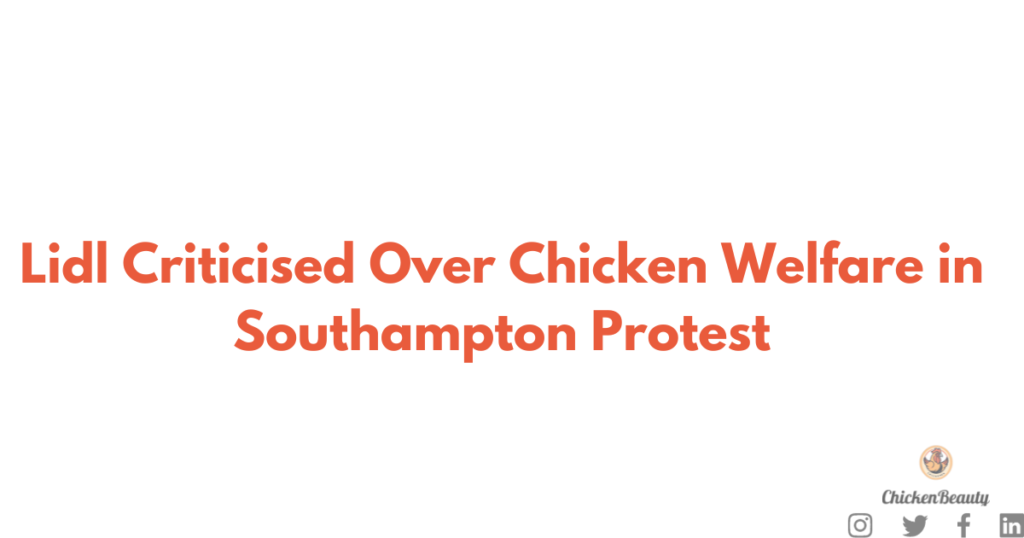Lidl Criticised Over Chicken Welfare Activists associated with The Humane League UK contend that the supermarket’s executives are not adequately addressing what they perceive as “cruel” practices. They are calling on Lidl to support the Better Chicken Commitment (BCC), a welfare policy that stipulates the use of slower-growing breeds, increased space, access to natural light and enrichment, adoption of less distressing slaughter methods, and the implementation of third-party auditing.
Outside Lidl’s High Street store, organizer Olivia Addy, holding cardboard cut-outs of the company’s leaders, stated, “We’re here to raise awareness among the public and gather their opinions on Lidl chickens. We’re showing them images depicting how the chickens are treated and seeking public input. Lidl’s chickens have a remarkably short lifespan of only 35 days, enduring extremely cramped conditions. One of the major issues is the use of Franken Chickens, causing rapid growth, resulting in various health problems, rendering them unable to support their weight on their legs and leading to a miserable life.”

Lidl Criticised Over Chicken Welfare
Lidl, in an official statement, defended its practices, citing adherence to industry standards. However, public reactions varied, with some expressing dissatisfaction at what they perceived as insufficient commitment to animal welfare.
Residents in Southampton raised specific issues, including cramped living conditions for chickens and questionable slaughtering practices. The protestors demanded transparency and immediate improvements in Lidl’s supply chain.
Lidl chicken ‘already meets BCC’s requirements’
A spokesperson from Lidl stated, “We recognize the imperative to transform livestock farming and are actively collaborating with our suppliers throughout the entire supply chain to enhance animal welfare standards continuously. This involves addressing the preferences of our customers in each of our markets. Through this collaborative approach, we can establish practical measures and minimum targets for both ourselves and our suppliers, implementing them progressively within our product range.
In the UK, all fresh chicken supplied to Lidl GB adheres to nationally recognized third-party standards, including Red Tractor Assured, RSPCA certification, and Soil Association Organic. Furthermore, Lidl GB’s free-range RSPCA Assured chicken not only meets but surpasses the requirements of the Better Chicken Commitment.
We wholeheartedly support the objectives of the Open Wing Alliance and its members in enhancing animal welfare standards in poultry farming. We maintain an open dialogue with them, engaging in extensive and constructive discussions, with our most recent meeting taking place just last month.
Despite our commitment to improvement, we prioritise setting goals that are fundamentally and realistically achievable to ensure we fulfil our promises. Achieving the requirements of the European Chicken Commitment by 2026 necessitates collaborative efforts from industry leaders across the sector.”
Why Are Residents Worried?
Environmental Impact
The environmental impact of ongoing projects is a paramount concern. Residents fear potential harm to local ecosystems, green spaces, and wildlife habitats. This section explores the specific aspects of the projects that raise environmental concerns.
Traffic and Infrastructure
The surge in development often brings increased traffic and strain on existing infrastructure. Southampton residents are apprehensive about the potential congestion and its impact on their daily lives. We delve into the specifics of these concerns and the potential solutions.
Noise Pollution
With development comes noise, and residents are worried about the potential increase in noise pollution affecting their quality of life. This section discusses the measures being considered to mitigate noise-related concerns.
Impact on Property Values
Property values are a key concern for homeowners. Residents worry about the impact of large-scale projects on their property investments. This section explores the factors contributing to these concerns and the efforts to safeguard property values.
Safety Concerns
Residents are keenly focused on safety issues arising from ongoing projects. This section discusses the safety measures being implemented to address the worries related to construction and increased activity in the area.
Chicken Welfare Standards in Retail
This section compares Lidl’s chicken welfare standards with industry benchmarks, shedding light on whether the company’s practices align with broader industry norms.
Public Perception and Consumer Boycott
The protest has significantly impacted Lidl’s public image, with reports of a growing consumer boycott. This section explores the potential long-term consequences of such public backlash.
The controversy surrounding Lidl may influence other retailers to reevaluate their chicken welfare practices. Industry-wide shifts towards more ethical standards could be on the horizon.
Various animal rights organisations have joined the conversation, calling for a reevaluation of industry practices. This section highlights their stance on Lidl’s practices and their role in advocating for change. The protest’s rapid spread on social media emphasises the burstiness of information dissemination. This section explores how digital platforms amplified the voices of protestors. Balancing profit and ethical practices presents a perplexing challenge for retailers. This section delves into the complexity of navigating the fine line between business goals and ethical considerations. Post-protest, Lidl announced several commitments to improve chicken welfare. This section analyses the effectiveness of these measures and whether they address the concerns raised.
Future of Chicken Welfare in Retail
As public scrutiny intensifies, the article predicts potential changes in industry practices and emphasises the need for ongoing vigilance in monitoring corporate conduct. Consumers now wield significant influence in shaping corporate practices. This section discusses how informed consumer choices can drive companies to prioritize ethical considerations.
Conclusion
In conclusion, the Southampton protest against Lidl underscores the growing importance of ethical considerations in the retail sector. The industry faces a critical juncture, and consumers have the power to drive positive change through their choices.
FAQs
How did the protest in Southampton gain traction?
Social media played a crucial role in amplifying the protest, with activists and residents sharing images and testimonials.
What specific concerns were raised by Southampton residents?
Residents expressed concerns about cramped living conditions for chickens and questioned Lidl’s slaughtering practices.
How has Lidl responded to the criticism?
Lidl defended its practices in an official statement, citing adherence to industry standards, but public reactions varied.
Are there ongoing consumer boycotts against Lidl?
Yes, there are reports of a growing consumer boycott in response to the controversy.

